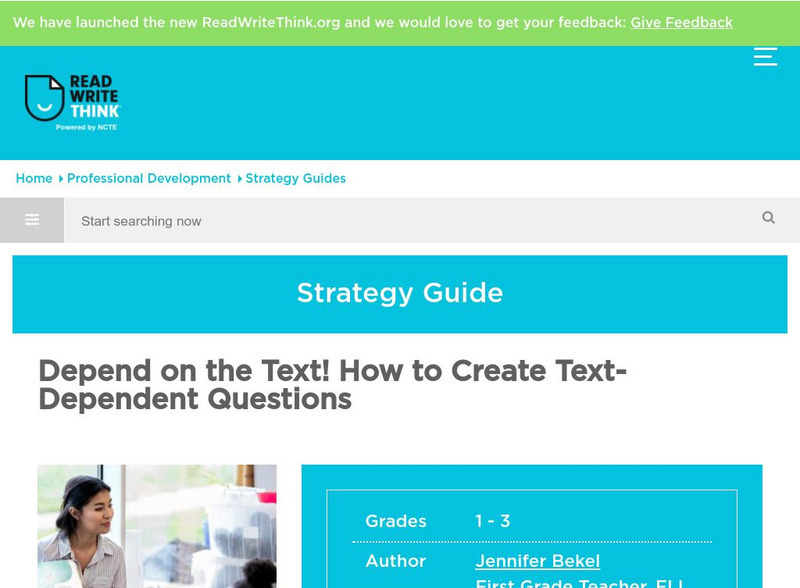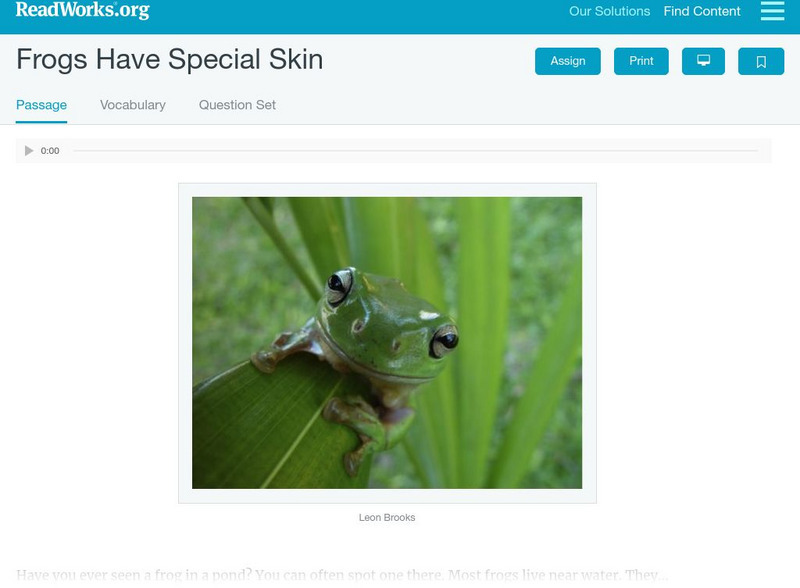Better Lesson
Better Lesson: Asking and Answering Questions About Our Story
A lesson plan with all resources included for asking and answering questions to strengthen comprehension.
Better Lesson
Better Lesson: Question: Do You Know Your Question Words?
Once students realize they are able to gain more information and expand their learning by asking questions, they love to use their question words. In the end, the more students ask, the more they will have to answer; therefore, the more...
Read Works
Read Works: Read Aloud Lesson: Whoever You Are
In this read-aloud lesson, students will identify similarities among people around the world in order to determine the theme of the story. Included is a detailed lesson plan, graphic organizer for guided practice, and an independent...
CPALMS
Cpalms: Understanding Key Details by Using Pancakes for Breakfast
[Free Registration/Login Required] In this lesson, students will be read Pancakes for Breakfast by Tomie DePaola in order to understand and describe people, places, things and events in a text. They will create a book by drawing or...
Better Lesson
Better Lesson: Guess My Solid
Descriptive details are used as students develop a guessing game poster for others to try and guess their chosen solid. Included in this detailed lesson plan are videos, samples of student work, a printable worksheet, an assessment...
Education.com
Education.com: Asking Questions and Finding Answers
[Free Registration/Login Required] Pretending to be someone else is so much fun! In this hilarious lesson, students will get to take on the persona of a book character as they practice their question and answer skills. At the conclusion...
Better Lesson
Better Lesson: The Power of Questions
Students will have the opportunity to work collaboratively by using the Think-Pair-Share technique to ask questions about a story. Included are examples of student's questions, and a Think-Pair-Share poster and document.
Reading Rockets
Reading Rockets: Reading Basics: Comprehension
Provides articles, parent tips, research briefs, and a video on how to teach reading comprehension.
CPALMS
Cpalms: Giraffes and Zebras Oh My!
[Free Registration/Login Required] For this lesson, young scholars will be able to ask and answer questions about key details in a text. Additionally, students will also be able to identify, compare, and contrast characteristics between...
Better Lesson
Better Lesson: With Prompting and Support, Ask and Answer Questions
Choose from a variety of lessons that meet the Common Core standard of asking and answering questions about unknown words in nonfiction texts.
Michigan State University
Michigan State University: Interventions for Reading: Reconciled Reading
This intervention, which is based on Schema Theory, engages students in enrichment activities prior to reading the passage. In this way, students have the opportunity to activate and enhance existing knowledge before reading....
Writing Fix
Writing Fix: The Wacky "I Will Not" Chalkboard
Students can use this writing idea from the book Wacky We-Search Reports by Barry Lane to demonstrate understanding in any content area. Students use the idea of writing "I will not " sentences to show their knowledge of various...
Curated OER
Mc Graw Hill: Part 1: Reading Literature
Learn how asking and answering questions can help readers understand literature better. Site includes a model and an example of how to use this system.
Curated OER
Mc Graw Hill: Part 1: Reading Literature: 1st Grade Retell Stories
Learn how to use retelling a story to increase student's comprehension of a story.
Curated OER
Mc Graw Hill: Part 1: Reading Literature: Use Illustrations and Details
Learn how drawing characters, settings, and events can help with reading comprehension.
Family Education
Family Education: Fifteen Minute Reading Activities
What can you do with your child in fifteen minutes to improve their reading skills? This site has a list of reading activities.
Florida Center for Reading Research
Florida Center for Reading Research: Expository Fact Strip [Pdf]
A lesson plan in which students read a text and identify the topic and four facts presented within the text. Materials are included.
ReadWriteThink
Read Write Think: Depend on the Text! How to Create Text Dependent Questions
This strategy guide focuses on writing text-dependent questions which require the student to reread the text to support their answers. It offers a list of what to do to create these questions that progress from establishing general...
Read Works
Read Works: Comprehension Units
[Free Registration/Login Required] Reading comprehension units for grades kindergarten through fifth grade are available on this site. Units consist of read aloud questions and paired passages. Multiple Lexiles are shown, along with...
Read Works
Read Works: Frogs Have Special Skin
[Free Registration/Login Required] An informational text about frogs and their unique skin. A question sheet is available to help students build skills in reading comprehension.
Read Works
Read Works: How to Draw a Map Passage & Question Set
[Free Registration/Login Required] This informational text passage explains how to draw a map. This passage reinforces essential reading comprehension skills. Opportunities for vocabulary acquisition are also included. Several questions...
Read Works
Read Works: So Many Kinds of Food!
[Free Registration/Login Required] A literary text about a little girl named Lisa who likes to eat many different kinds of foods. A question sheet is available to help students build skills in reading comprehension.
Read Works
Read Works: In the Night Passage & Question Set
[Free Registration/Login Required] This literary text passage shares a first person account of a cat and its night on the prowl. This passage reinforces essential reading comprehension skills. Opportunities for vocabulary acquisition are...
Read Works
Read Works: Explicit Information 1st Grade Unit
[Free Registration/Login Required] A two-lesson unit in which students learn how to identify explicit information in both fiction and non-fiction texts. The lessons utilize the books Frogs by Gail Gibbons and Stellaluna by Janell Cannon....


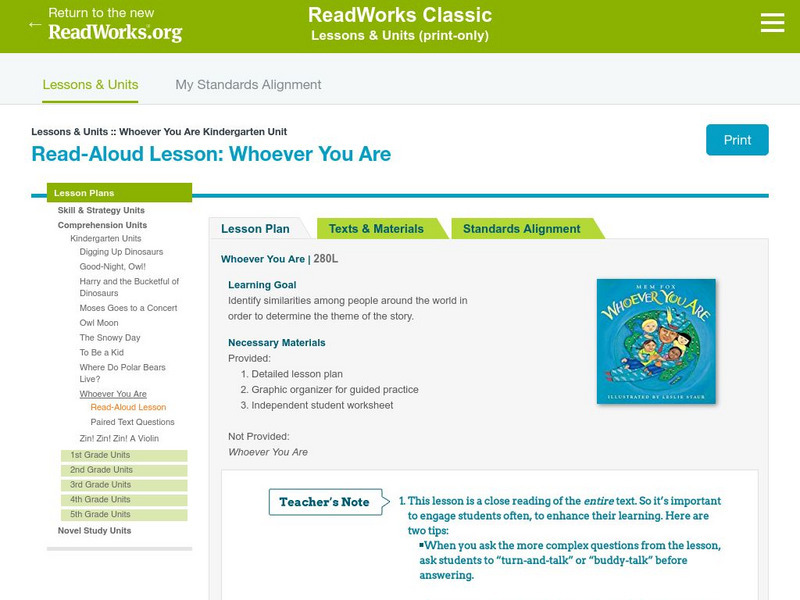
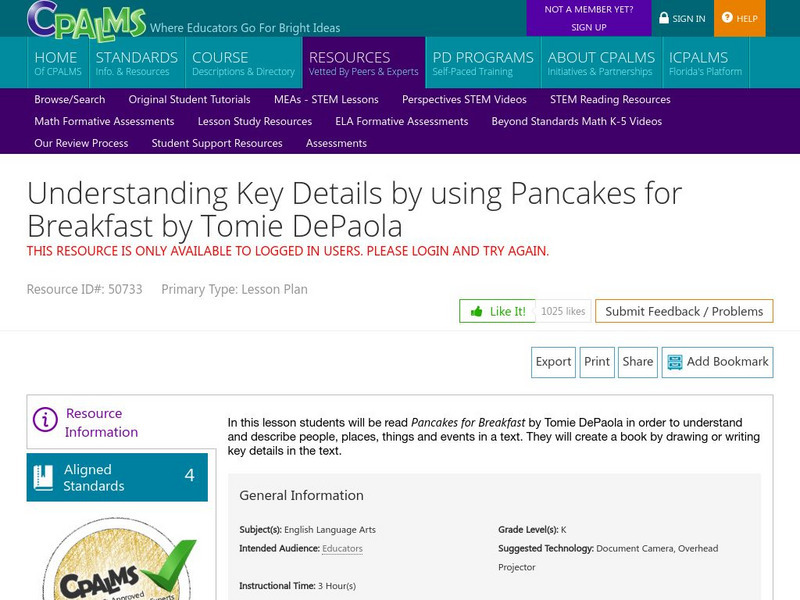






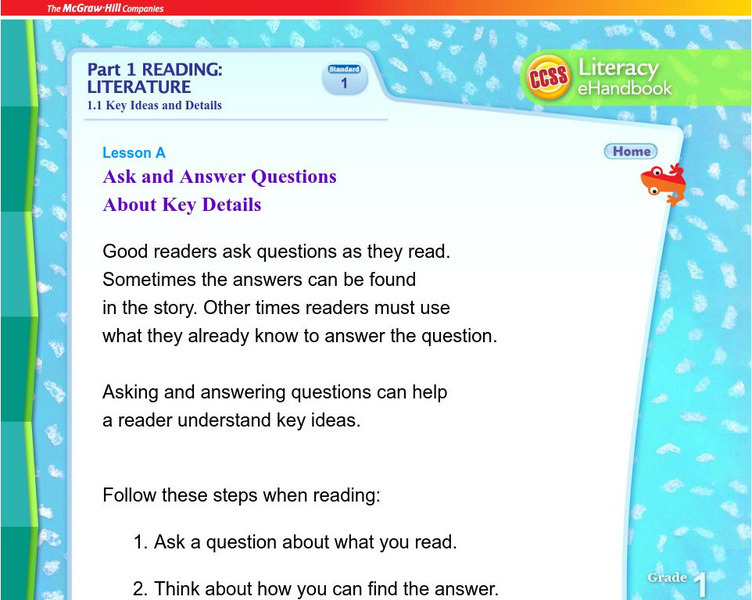


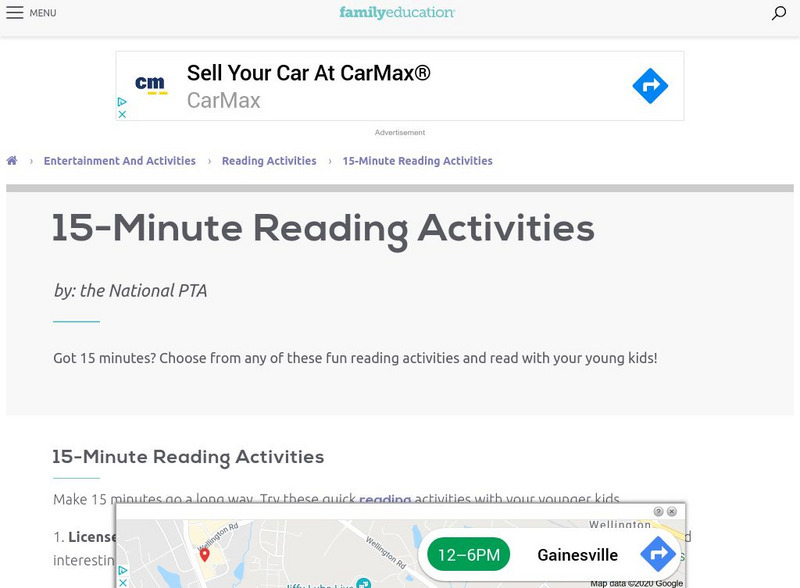
![Florida Center for Reading Research: Expository Fact Strip [Pdf] Lesson Plan Florida Center for Reading Research: Expository Fact Strip [Pdf] Lesson Plan](https://content.lessonplanet.com/knovation/original/101726-6e9433c83ac2e2bbad9c1c7411098251.jpg?1661786954)
